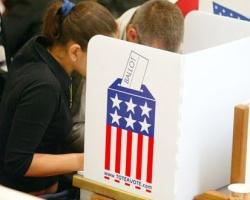Lauren McLaughlin and Jeremiah Shaw spent Friday morning supporting efforts to sign up new voters through a Christian program called “Redeem the Vote.”
They’re members of Northland, A Church Distributed, and committed evangelical Christians, but like many other Central Florida evangelicals, they haven’t figured out how they’ll vote in Tuesday’s presidential primary.
McLaughlin, 19, a student at the University of Central Florida, said Friday that she was “still researching. The compassion issues and global policy are most important to me.”
Shaw, 20, a Rollins College student, said, “One of the qualities I am looking for in a candidate is leadership – a person who can unite the country and inspire people in their community and around the world.”
They’re evidence of a new set of concerns among Christian voters. Long seen as ultraconservatives whose main focus was hot-button social issues such as abortion and gay marriage, some evangelicals now are looking more broadly at issues ranging from poverty to the environment to America’s place on the world stage.
“There’s such a breadth of evangelical voters, because there’s no monolithic bloc,” said the Rev. Joel Hunter, Northland’s pastor, who cast an early ballot for former Arkansas Gov. Mike Huckabee.
“Each candidate speaks to a different interest of the evangelical perspective, and each is getting a share of the pocketbook and family-values vote,” said Hunter, author of A New Kind of Conservative.
And this has turned the Republican campaign into a free-for-all scramble for the votes of white evangelicals – a pivotal bloc of 25 to 35 percent of Floridians likely to vote in the GOP primary.




